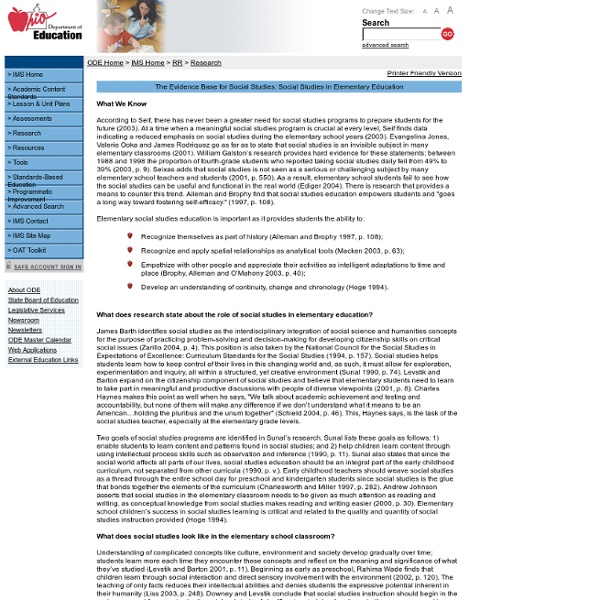Powerful and Purposeful Teaching and Learning in Elementary School Social Studies
Rationale The advancement of “liberty and justice for all,” as envisioned by our country’s founders, requires that citizens have the knowledge, attitudes and values to both guard and endorse the principles of a constitutional democracy. Beginning to build this knowledge at an early age involves educators who are well grounded in social studies educational practice. Social studies at the elementary level should provide students with purposeful and meaningful learning experiences that are challenging, of high quality, and developmentally appropriate. The marginalization of social studies education at the elementary level has been documented repeatedly.1 According to a report by the Center on Education Policy, since the enactment of the “No Child Left Behind” federal education policy (NCLB), 44 percent of districts surveyed have reduced time for social studies. A. In social studies, as in any knowledge domain, learners benefit from having a variety of ways to understand a given concept.
Social Media for Teachers: Guides, Resources and Ideas
Although students are evermore connected to the social web, many of these networks remain out-of-class digital playgrounds where students congregate. In a 2014 survey of 1,000 teachers, just one in five said they use social media regularly with students. Of course, it can be a challenge to incorporate social media into lessons. There are many gray areas for teachers to navigate, like setting guidelines, accessibility at school, and student safety. But to help teachers navigate this ever-changing landscape of social media tools, here are some of the best guides on the web for four popular networks, Facebook, Instagram, Twitter, and Pinterest. More Great Reads From Edutopia In addition to those great guides, there is a lot of useful information right here on Edutopia.
Justification
brainpop
Whether your students are using Apple©, Android™, Windows 8, or Chrome™ devices, there’s a BrainPOP app for you. Ideal for BYOD (Bring Your Own Device) and other mobile learning environments, mobile access is now an integral part of all BrainPOP Jr. (K-3), BrainPOP, and BrainPOP Español subscriptions. The BrainPOP Featured Movie and BrainPOP Jr. Movie of the Week apps regularly deliver fresh movies, quizzes, and bonus features right to your handheld device. They cover a breadth of relevant topics including current events, historical figures and milestones, holidays, curricular subjects, and more. Our Featured Movie app for the iPad, iPhone and iPod touch has been downloaded millions of times and lauded in thousands of reviews. Visit BrainPOP Educators for a selection of mobile learning best practices! For K-3 students, check out the BrainPOP Jr. For English language learners and teachers, there's the BrainPOP ESL app.
Best Kids Apps | iPhone, iPad, Android | Toddlers, Educational, Games
Justification
Social Studies for Kids
What to expect in preschool: Social studies - Academic Skills
By Diana Townsend-Butterworth Preschool gives children their first sense of community outside the home. Social studies learning begins as children make friends and participate in decision-making in the classroom — then it moves beyond the school into the neighborhood and around the world. The classroom Preschool is a safe, caring community with an orderly routine, and each child is valued as an individual. Everything in the classroom lends itself to learning the concepts underlying social studies. The neighborhood Teachers help children apply the concepts they learn in their classroom to an understanding of their neighborhood. Class trips Preschoolers often go to restaurants to learn how meals are prepared and served. Holidays Teachers take advantage of holidays to teach children about their history and to make them aware of different cultural traditions. Special visitors The classroom library Children also learn about their history and other cultures through books they see in the classroom.
40 Maps That Will Help You Make Sense of the World
If you’re a visual learner like myself, then you know maps, charts and info graphics can really help bring data and information to life. Maps can make a point resonate with readers and this collection aims to do just that. Hopefully some of these maps will surprise you and you’ll learn something new. A few are important to know, some interpret and display data in a beautiful or creative way, and a few may even make you chuckle or shake your head. If you enjoy this collection of maps, the Sifter highly recommends the r/MapPorn sub reddit. 1. Map by Google 2. Map via Wikimedia Commons 3. Map by Stuart Laycock (via The Telegraph) 4. Map by eatrio.net via Reddit Pangea was a supercontinent that existed during the late Paleozoic and early Mesozoic eras, forming about 300 million years ago. 5. Map by Business Management EU 6. Map by The New York Times 7. Map by Teepr on Reddit 8. Map by ChartsBin.com 9. Map by Phoenix B 1of3 10. Map by Carna Botnet via Reddit 11. Map by Vizual Statistix 12. 13. 14. 15.
Justification



